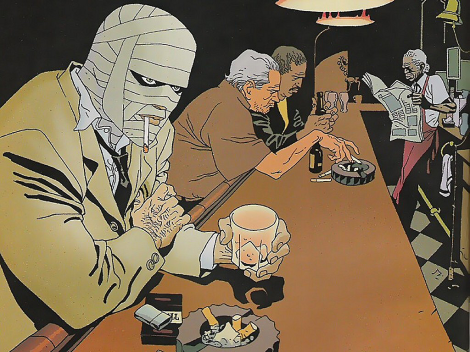100 Bullets
By Mistermorriss 1 Comments

Having recently read Brian Azzarello and Eduardo Risso’s 100 Bullets I could help but be compelled to write about them. However, exactly what angle, what approach, I should take has until now stopped me putting finger to key. Should I perhaps try and mirror the superb narrative style and the dark, gritty atmosphere? I could do a noir-esque review riddled with simile, wise-cracks and the smoking of too many god damn cigarettes. Or should I try and reflect the complexity of the plot by flitting in and out of explanation points, mixing straight narrative with metaphor and then introducing a new line of argument from left field leaving my reader a little confused, but also perhaps impressed as they may never have seen such a bold attempt at a review before?
Unfortunately, these ruminations reek of someone trying who is trying to write, rather than just writing; a forced narrative that doesn’t quite know what it wants to say or where it’s going. One however, that if written well enough will be enough to satiate the readership. It would be the work of an extremely skilled artisan who somehow, somewhere got lost. So although the lines and curves of the piece would be straight enough, the paper on which they are drawn would at times be crumpled and dog-eared, looking like something that was found beside the waste paper basket, flattened out and tossed in at some random juncture that you’d make sure you made sense of later.
However, should we berate the writer for this? Surely such an undertaking deserves praise. Perhaps the writer set his sights a little too high; used more ink than he had pen. Shouldn’t we all be grateful for the effort? Surely a bar has been raised here? Ok, so it can read forced at times, like a student a couple of thousand characters short of their word limit, but it’s original nonetheless and sends a message out that work such as this deserves a place on your shelf, in your life, regardless of any and all valid criticism.
You still with me?

Gabe
This for me is how Azzarello wrote 100 Bullets. This is how it comes across. It’s amazing. Literally. Both interpretations of the word included. ( 1. To affect with great wonder; astonish.2. To bewilder; perplex.) Both definitions work perfectly.
The initial premise is what grabs you: the idea of a man who knows everything about your life and exactly what when wrong and where. On top of that, he knows who’s responsible. More importantly, he gives you the opportunity to do something about it: 100 untraceable Bullets, the gun with which to fire them and the evidence leading you to the ‘perp’. You’re not asked to do anything about it, the choice is yours. You have the freedom. A fantastic political pastiche of America – the freedom to choose, with a gun in your hand. Will you act with righteous vengeance, or will you do nothing? It’s the kind of beauty that arises from lying in dirty sheets for too long.

The ultimate femme fatale
It’s a premise that bares fruit to some incredibly sexy, moving, exciting superbly written vignettes that stay with the reader long after the pages are turned. Risso’s thick lines weave theords into violently pretty images than hold the eye. When it comes together, there is no finer comic I’ve read. The story of Gabe caught me with a surprise left, jaw left hurtin’, eyes wide open, whilst Megan’s luscious yet conniving curves stroked my right, blowing softly in my ear.
Heartbreak, Sunnyside Up is a work of art and the detective short, The Counterfifth Detective goes a few rounds with Raymond Chandler – I cannot praise it highly enough.
The downside to all this is that unfortunately Azzarello deemed the superb mystery that entwines all the early fragments needed an explanation. We should be told why and how Agent Graves does what he does, attaché case to attaché case. What gave the windows steel bars was the fact that we looked through the gaps into people’s lives not know where the bars came from and why, we just had to live with them and sometimes strain our necks. We were left to wonder what the full picture looked like, free from obscurity. That was the redeeming feature.

Milo. Sounds a lot like Marlowe. Reads like it too. (That’s a huge complement, btw).
It also has to be said that at times it simply reads like both artist and author had no idea what was going at times; confusing angles and a loose narrative to point of incoherency. Still, as stated earlier, such criticisms – and they are very valid criticisms – should not hold you back from reading every page of all 100 comics. No matter how messy it gets, when Brian Azzarello and Eduardo Risso clean house do they clean house. “Any and all valid criticism” can go to hell.
